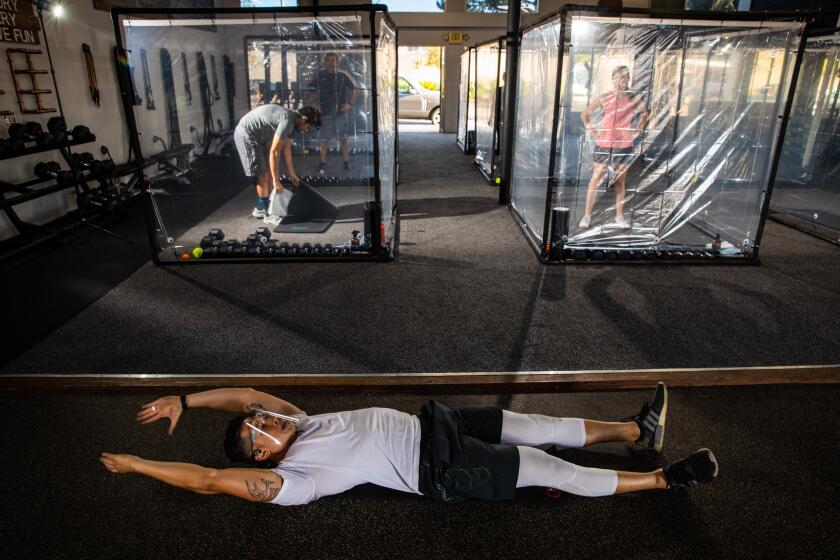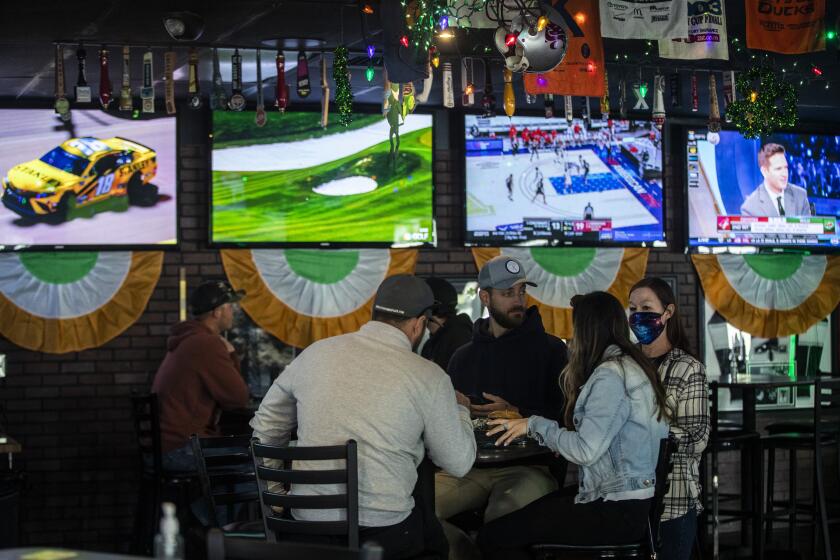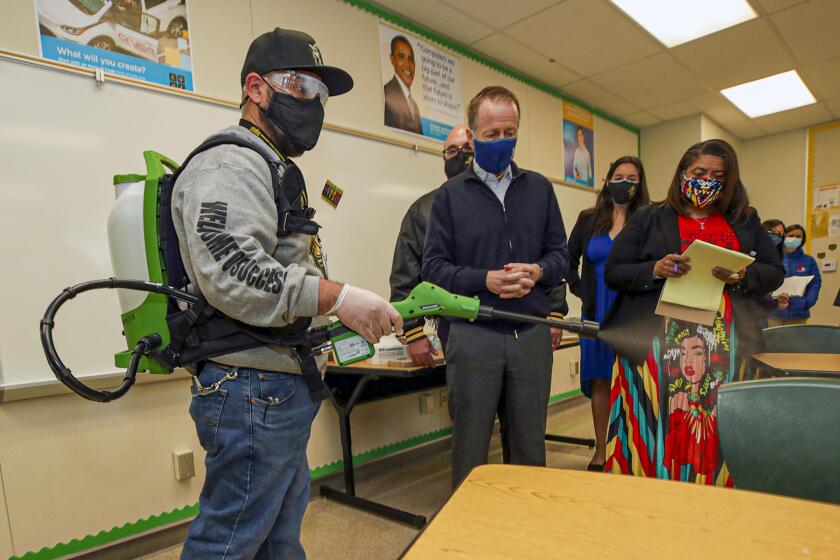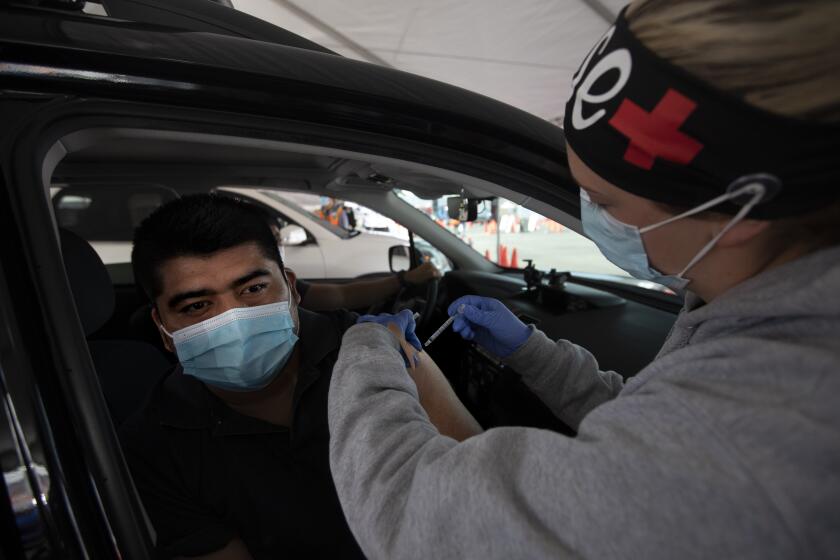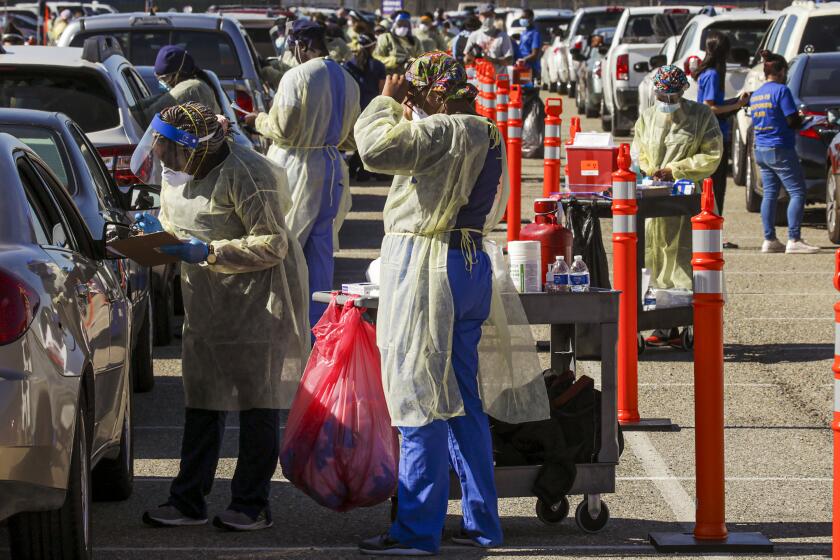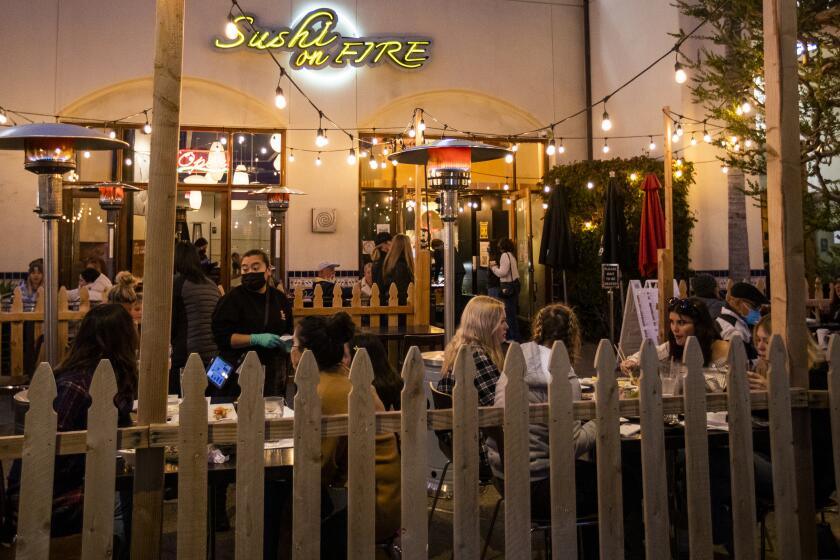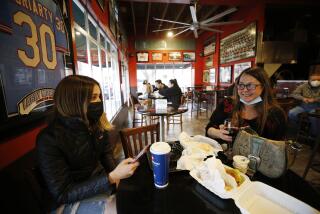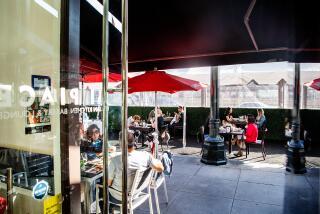Welcome back: Restaurants, movie theaters, gyms reopen in L.A. County today
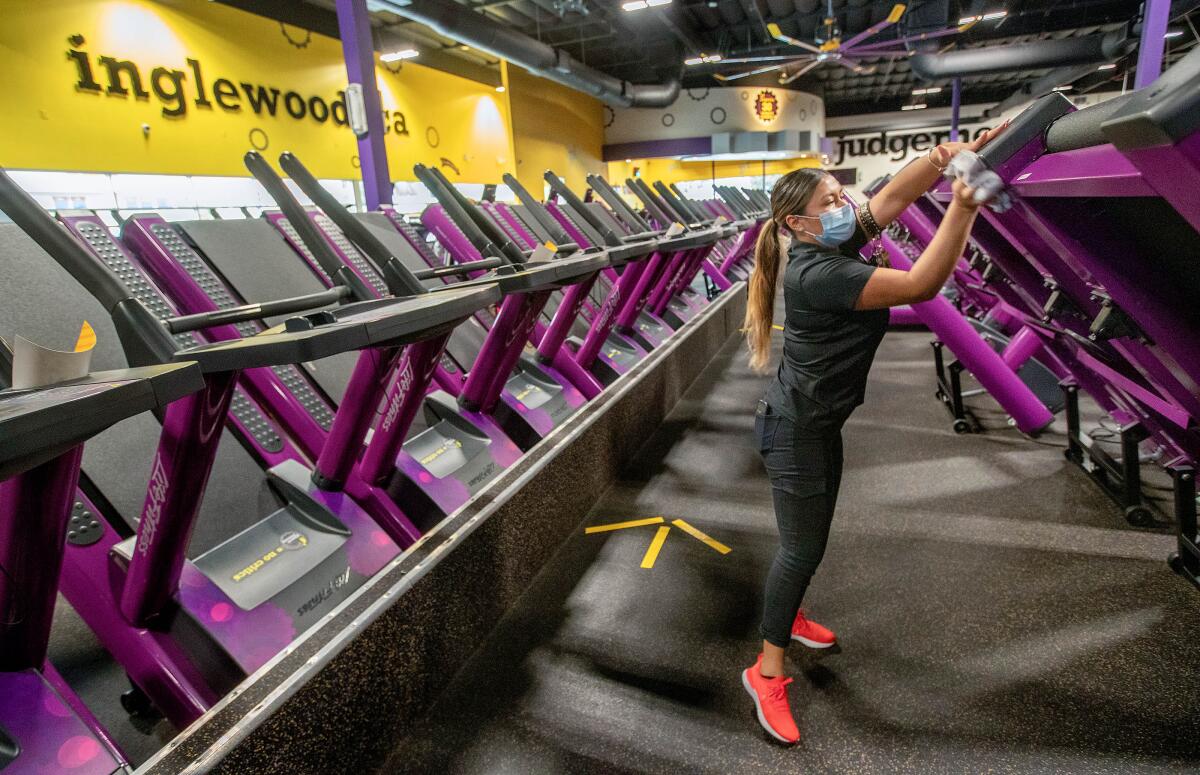
- Share via
This time last year, Jacqueline Canter spent her birthday furloughing about 100 employees by phone, hoping she eventually would be able to call them back to work.
“It was so heartbreaking,” the co-owner of Canter’s Delicatessen said Monday. “I had no idea [the pandemic] would go on for a year.”
She spent her latest birthday weekend calling some employees to offer them their jobs back.
Restaurants, movie theaters, gyms reopen in L.A. County today
“Now that we’re open, it’s certainly a good birthday,” Canter said Monday. “My birthday wish came true.”
After months of crippling COVID-19 closures, Los Angeles County has unlocked a significant portion of its battered business sector, allowing the return of in-restaurant dining and the resumption of indoor activities at gyms, movie theaters and other venues.
Proprietors and employees alike hope the latest round of reopenings — prompted by falling numbers of new coronavirus cases and rising vaccinations — will give the region’s economy a desperately needed shot in the arm.
But business as usual remains a far-off concept, and those establishments that are open are still subject to restrictions on how many customers can be served at a time, as well as requirements for physical distancing and face coverings.
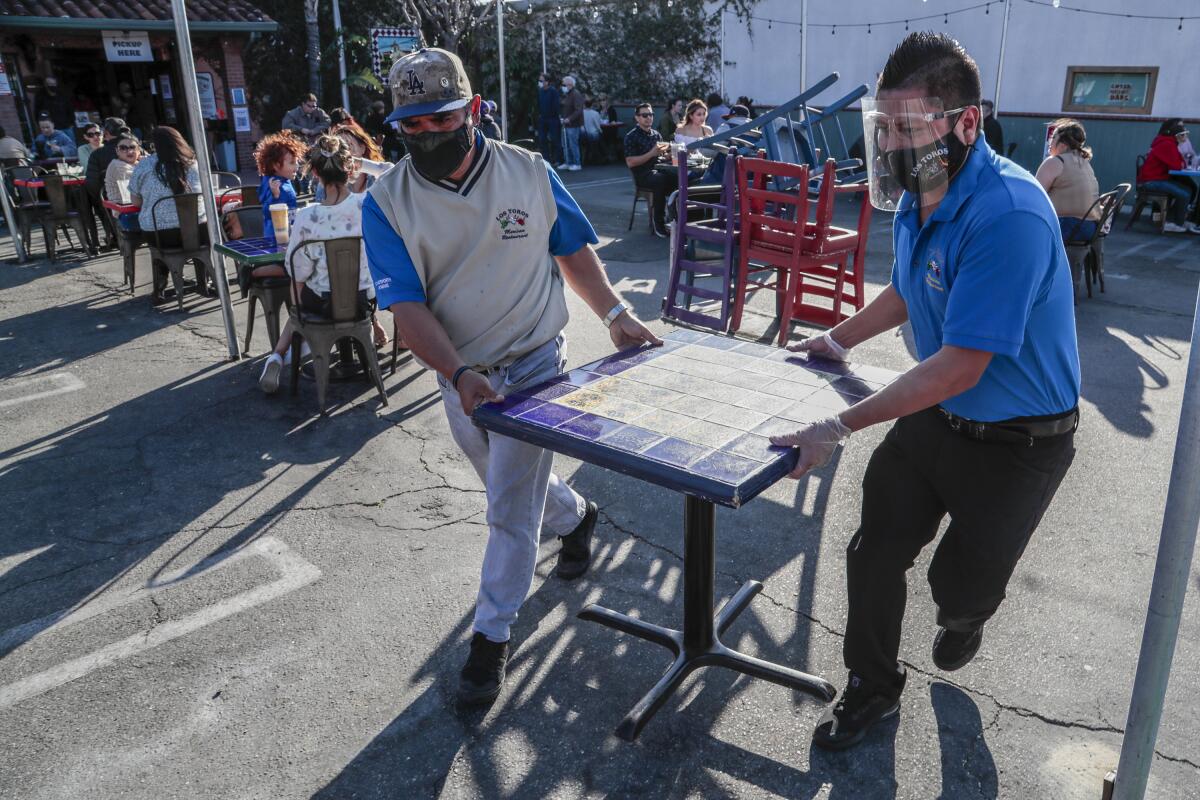
As L.A. County Public Health Director Barbara Ferrer noted Monday, “just because certain activities are allowed, or certain reopening protocols are revised, does not mean that these activities are 100% safe and without risk.”
“We’re still in the middle of a pandemic, and whenever there are more opportunities for interactions with people not in your household, there could be more transmission of the virus,” she said during a briefing. “We do, however, have the tools to protect ourselves from increased transmission. We just need to use them and not get complacent.”
L.A.’s wider reopening was made possible by its advancement from the purple tier, the strictest category in the state’s four-level coronavirus roadmap, to the more lenient red tier.
A dozen other counties — Orange, San Bernardino, Contra Costa, Sonoma, Placer, Mendocino, San Benito, Tuolumne, Siskiyou, Amador, Colusa and Mono — also officially progressed over the weekend.
Those 12, along with L.A., are home to a total of 17.7 million Californians.
Moving from purple to red clears the way for those counties to: permit indoor dining at restaurants and movie theater showings at 25% capacity; welcome back students in person in grades seven through 12; reopen indoor gyms and dance and yoga studios at 10% capacity; and expand capacity restrictions at nonessential stores and libraries.
L.A. County will allow theaters, restaurants, gyms and more to more widely reopen Monday. The changes come as COVID-19 cases continue to plummet.
Museums, zoos and aquariums also can reopen indoor operations, at 25% capacity.
Franks Enriquez, wife Sarah and their 1-year-old daughter, Skylynn, were gazing at an 8-foot wolf eel at Long Beach Aquarium when they spotted another family approaching. They stepped back to keep a distance from the other group.
“We still try to be cautious,” Sarah Enriquez said.
After months of being holed up indoors, leaving only for work or other necessary trips, the Bay Area couple felt encouraged enough by rising vaccination rates and sinking infection levels to visit family in Long Beach.
“I haven’t been out in such a long time,” Sarah Enriquez said.
Starting April 1, amusement parks can reopen at 15% capacity, with other modifications, in red-tier counties. Attractions such as Disneyland, Universal Studios, Knott’s Berry Farm and Six Flags Magic Mountain will initially be required to limit visitors to California residents.
Outdoor sports, with fans, and outdoor live performances also will be allowed to resume April 1, provided restrictions are adhered to on capacity and concession sales, which vary based on a home county’s tier assignment.
Restaurants, gyms and other businesses in Orange and San Bernardino counties are reopening indoor operations Sunday.
Canter and her brother, Marc, said they worked until midnight Sunday to prepare the deli ahead of its reopening.
They had to tune up refrigeration equipment that had not been used for nine months, turn the power back on in the main dining room and move tables so they were eight feet apart. They wiped down tables, booths and anything else that needed sanitizing.
When then when it was time to open, it rained.
“Usually, people come in here on a rainy day to have soup,” Jacqueline Canter said. “But today, the rain didn’t help us.”
Still, four regulars sat in booths Monday morning, eating breakfast.
Among them was Bob Knee, 72, who has been coming to the restaurant since he was 16. He ordered sausage and eggs and said eating inside felt “normal again.”
“It’s wonderful,” he said.
Elizabeth Núñez, 32, a waitress, was laid off from Canter’s a year ago. She stayed at home and took care of her four kids — acting as a cook, a waitress, mother and teacher, sometimes all at once.
“It was stressful,” she said, adding that she was happy to be back at work.
As she dropped off the bill, Knee jokingly said, “I didn’t order any of that.”
Núñez squinted, flashing a hint of a smile.
“Bob, it’s not April Fools’ yet,” she responded.
About half of students plan to return to campus, based on early, partial results of a parent survey. Areas hard hit by COVID-19 are less enthusiastic.
Cecilia Maya, 33, and Jennifer Rivera, 21, were among the patrons who ventured inside Collaborative Coffee Bar in Lakewood.
Another group, a few of them regulars, sat on a couch and chairs around a coffee table, while a single barista — the owner — took orders and made drinks.
Maya and Rivera didn’t expect the shop to be open indoors, but given the morning drizzle, it was a welcome surprise.
“It didn’t hit me that we’d be able to sit indoors,” Maya said. “You just adapt to living this way.”
Collaborative Coffee, like many other coffee shops in the county, created an outdoor space for patrons. But for Rivera and Maya, it just wasn’t the same.
“I feel like [outdoors] people are just eyeing you, asking, ‘Are you leaving?’” Rivera said. “Indoors, you’re just chilling. Here, I can set up camp.”
The two friends said they felt safe in Collaborative, which had distanced seats to accommodate a maximum of about nine people.
When owner Robert Lopez, 30, saw the news that some county businesses would be able to open indoor seating with limited capacity, his mind immediately went to his cafe and how he could reorganize to accommodate people safely.
He rearranged the seats himself Sunday, adding a few to the couch area, another small table nearby and a single bench with a table on the other side of the cafe.
By mid-morning Monday, the few available seats inside the coffee bar were taken. Lopez said was happy to offer shelter from the morning’s rain.
But the vibe was off. It’s hard to feel a sense of excitement or hope, even with the positive changes, he said.
He worries about his customers. Did they feel comfortable? What about those ordering to go?
“What if that thing we’re hoping for is taken away right away?” Lopez said in an interview after closing his shop. “It has bummed me out. You want to be excited and hopeful, but you just don’t know. It leaves you in a place where your security is not all there.
“It almost makes you feel really lonely.”
The past year has left him feeling distrustful of government officials. He questions whether they really understand the difficulties of having to adapt, time and again, on a moment’s notice.
For Lopez, though, safety is still top of mind. An uncle of his is on a ventilator fighting for his life, and a couple of his friends have died from COVID-19.
Until government officials and the Centers for Disease Control and Prevention say it’s OK to gather in larger numbers without spreading the coronavirus, he won’t feel he’s in the clear.
“There’s always that, ‘What if?’” he said. “That will never go away.”
People are being asked to follow an honor system as vaccine supplies remain limited throughout California.
Haqumai Sharpe was at an LA Fitness in Inglewood on Monday morning, eager to hit the gym after not visiting one for a year. Sharpe, 47, used to frequent the gym at least four to five times a week; but during the lockdown, he shifted his workouts to playing tennis and running near his Inglewood neighborhood.
Now that he’s been vaccinated, Sharpe felt comfortable returning to the working out indoors, although he made sure to arrive before noon so he could find a somewhat isolated area to lift weights.
“It’s been a while,” he said. “I just missed my routine.”
For Frederic Osho, life without the gym was terrible.
“I put on weight,” he said. “I was depressed.”
Osho tried working out at home, but he missed the social element of exercising around other people and struggled to stay motivated.
Although L.A. waited until Monday for its red-tier reopenings, other counties — notably San Bernardino and Orange — threw their doors open as soon as they were allowed Sunday.
Virginia Ramirez, a hostess at Belgian Waffle Works in Lake Arrowhead, said the dining room of the popular family restaurant was slammed Sunday morning. “We’re really busy,” she said.
At Social Costa Mesa, a trendy New American eatery, patrons were eager to dine indoors, said Robert Garcia, the manager on duty.
“Business is solid right now,” he said over the clink of tableware and chatter of customers. “I can’t complain. We’re lucky to have what we have going on.”
But other establishments said customers were slower to return.
“It’s not a matter of when the government says you can open, it’s when people reestablish that routine,” said John Connor, owner of Tudor House, a historic dinner theater in Lake Arrowhead.
Starting Monday, millions of Californians with preexisting health conditions or disabilities will be eligible to sign up for a COVID-19 vaccine.
The recent wide ascension to the red tier was made possible after officials revised California’s reopening blueprint in light of hitting a self-set target of administering 2 million COVID-19 vaccine doses in the state’s most disadvantaged communities.
Counties are sorted into one of four color-coded tiers based on a few factors: new coronavirus case rates, the rate of positive results among those tested, and a health-equity metric intended to ensure that the positive-case rate in poorer communities is not significantly worse than the county’s overall figure.
It used to be that counties had to record a case rate, adjusted based on the number of tests performed, at or below 7.0 new coronavirus cases per day per 100,000 people to move from the purple to the red tier. With the state having met its initial vaccination goal Friday, however, counties with a case rate of up to 10.0 new cases per day per 100,000 people are now eligible to advance, provided they log two consecutive weeks of qualifying data.
As a result, 13 more counties — Sacramento, San Diego, Riverside, Ventura, Kings, Lake, Monterey, San Joaquin, Santa Barbara, Sutter, Tehama, Tulare and Yuba — are poised to join the red tier this week if their metrics hold.
State officials will update county-specific metrics and tier assignments Tuesday.
The risk of contracting the coronavirus while dining indoors at restaurants is one reason why L.A. County is requiring that those eating together live in the same household.
Despite the wider reopenings, now is not the time for Californians to let their guard down, officials say. Dr. Mark Ghaly, the state’s Health and Human Services secretary, said during a briefing Friday that there is still reason to be cautious about participating in newly allowed activities, such as dining indoors at restaurants, as any venue where people aren’t wearing masks the entire time carries a risk for infection.
The lingering risk of dining indoors at restaurants is one reason L.A. County is requiring that those eating together live in the same household. It is permissible, however, for people from up to three households to dine at the same table outdoors.
“As we begin to see some hard-earned reopenings, we must remain as vigilant as ever,” L.A. County Supervisor Hilda Solis said Monday. “Continued declines in cases are by no means a guarantee and, if we’re not careful, we could easily fall back into the purple tier or worse, experience another resurgence.”
More to Read
Sign up for Essential California
The most important California stories and recommendations in your inbox every morning.
You may occasionally receive promotional content from the Los Angeles Times.

